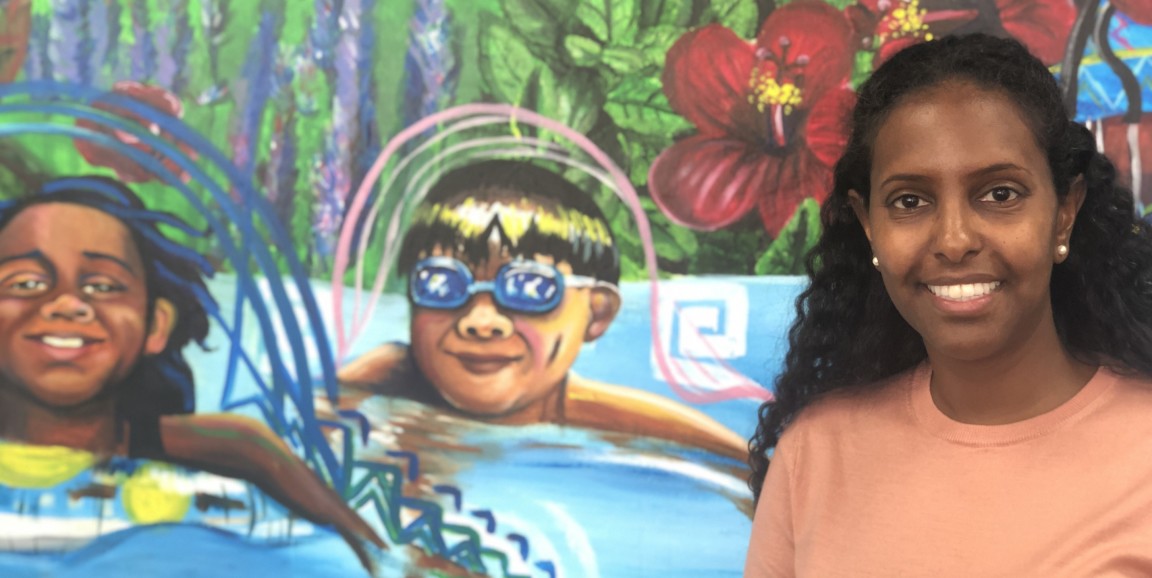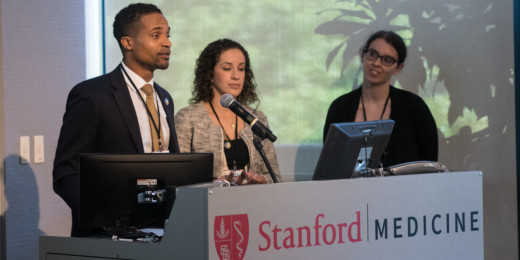On any given day, you might find pediatrician Lahia Yemane, MD, tending to young patients at Stanford's community clinic in Atherton, advising residents or working on a leadership training program to make medicine more diverse and inclusive. Yemane, who pronounces her name LAH-hiyah Yeh-MAH-neh, talked with me about her journey to Stanford and what she sees for her future:
I came here in 2010 to do my pediatrics residency and stayed as a chief resident, and then as faculty in general pediatrics. I'm also an associate program director for the pediatrics residency program.
I was born and grew up in Dallas, Texas, as an only child with a big extended family. I am a very proud child of immigrants. My parents moved to the United States from Eritrea in the late '70s.
Around eighth grade, I volunteered at the hospital where my mom worked as a nurse. I got to do vitals, help with paperwork, grab patients -- a lot more than what volunteers can do nowadays. I felt really helpful. Then at my high school, I was on a track for people interested in medical and health professions.
I don't know that there was this "aha moment" that I wanted to be a doctor, but there was never any second-guessing that I would be a pediatrician. I always loved kids and babysat for my neighbors and little cousins.
Easy: Three to five years old. At that age, they are starting to really develop their personalities. They're fun and challenging to talk to because they're so literal. And they still have a cartoon voice.
Three days a week, I see patients at the Gardner Packard Children's Health Center, a health center that provides care to Bay Area kids on Medi-Cal.
The rest of the time I'm on campus. I regularly meet with residents. Sometimes they want to have an informal check-in after they had a really rough rotation or we're discussing their goals and career plans. Your first year, there's a lot of impostor syndrome, especially in pediatrics, because in medical school you learn mostly adult care. So you start residency and you feel like you don't know anything. You need someone to tell you you're doing a great job and this is normal.
As I tell the residents, if you knew everything, why would residency exist? Medicine is so vast and ever changing: you have to let go of the idea that you will know everything and embrace a growth mindset for life-long learning.
Another thing I work on is the LEAD program, a program to provide leadership training and mentorship in creating scholarly works related to diversity and inclusion. The power of having residents, fellows and educators collaborate and create community has been extremely powerful.
I'm a binge watcher. I just watched "When They See Us." I feel like everybody should watch that.
And I really love music and going to concerts. The last three concerts I attended were Janet Jackson, Natalia Lafourcade and Common.
Tex-Mex, always. And of course I love Eritrean food. A typical dish is a spicy stew called tsebhi, made with meat or veggies that you eat with injera, which is a slightly sour spongy bread. I don't go out for it, because nothing's better than my mom's. I'd rather just wait until I go home or my mom comes and brings me a ton to freeze.
I'm trying to figure out the right balance of my clinical time and my administrative time. I feel like to be a good educator, I have to be a good clinician. I see the central theme of my career as working towards child health equity by advocating for patients, educating the next generation of pediatricians and collaborating to make the academic pediatric workforce more diverse. Every child should have the same access to opportunities to learn, grow and thrive.
Photo of Lahia Yemane at The Diversity Center of Representation and Empowerment (D-CORE) by Daphne Sashin






